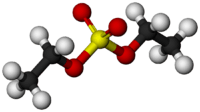Diethyl sulfate
 | |
 | |
| Names | |
|---|---|
| Other names
Sulfuric acid diethyl ester | |
| Identifiers | |
| 64-67-5 | |
| 3D model (Jmol) | Interactive image |
| ChEMBL | ChEMBL163100 |
| ChemSpider | 5931 |
| ECHA InfoCard | 100.000.536 |
| KEGG | C14706 |
| PubChem | 6163 |
| RTECS number | WS7875000 |
| |
| |
| Properties | |
| C4H10O4S | |
| Molar mass | 154.18 g·mol−1 |
| Appearance | Colorless liquid |
| Density | 1.2 g/mL |
| Melting point | −25 °C (−13 °F; 248 K) |
| Boiling point | 209 °C (408 °F; 482 K) (decomposes) |
| 0.7 g/100 mL | |
| Vapor pressure | 0.29 mm Hg |
| Hazards | |
| EU classification (DSD) |
Toxic (T) Carc. Cat. 2 Muta. Cat. 2 |
| R-phrases | R45 R46 R20/21/22 R34 |
| S-phrases | S53 S45 |
| NFPA 704 | |
| Flash point | 104 °C (219 °F; 377 K) |
| Related compounds | |
| Related compounds |
Dimethyl sulfate; diethyl sulfite |
| Except where otherwise noted, data are given for materials in their standard state (at 25 °C [77 °F], 100 kPa). | |
| | |
| Infobox references | |
Diethyl sulfate is a highly toxic and likely carcinogenic chemical compound with formula (C2H5)2SO4. It occurs as a colorless, oily liquid with a faint peppermint odor and is corrosive.
Diethyl sulfate is used as an alkylating agent to prepare ethyl derivatives of phenols, amines, and thiols. It is used to manufacture dyes and textiles.[1]
Toxicity
Diethyl Sulfate is a strong alkylating agent which ethylates DNA and thus is genotoxic. There is not sufficient evidence for the carcinogenic properties of diethyl sulfate in humans, but there is in animals. It is classified as a Group 2A carcinogen by the IARC [2]
Preparation
It can be prepared by absorbing ethylene into concentrated sulfuric acid or by fuming sulfuric acid into diethyl ether or ethanol.[3]
References
- ↑ "Diethyl sulfate". pubchem.ncbi.nlm.nih.gov. Pubchem. Retrieved 2016-03-06.
- ↑ IARC (1992). "Diethyl Sulfate". Summaries and Evaluations. 54. International Agency for Research on Cancer (IARC): 213.
- ↑ Dow (June 24, 2006). "Diethyl Sulfate" (PDF). Product Safety Assessment. Dow Chemical Company. Retrieved March 5, 2016.
Further reading
- Buck, J. R.; Park, M.; Wang, Z.; Prudhomme, D. R.; Rizzo, C. J. (2000). "9-Ethyl-3,6-Dimethylcarbazole (DMECZ)". Org. Synth. 77: 153.; Coll. Vol., 10, p. 396
- Theodore, S.; Sai, P. S. T. (2001). "Esterification of Ethanol with Sulfuric Acid: A Kinetic Study". Canadian Journal of Chemical Engineering. 79 (1): 54–64. doi:10.1002/cjce.5450790109.
External links
- "Diethyl sulfate". Webbook. NIST.
- "DIETHYL SULFATE -- ICSC: 0570". Inchem.
- "Diethyl sulfate" (PDF). IARC Monographs. 71. IARC. 1992.
This article is issued from Wikipedia - version of the 5/29/2016. The text is available under the Creative Commons Attribution/Share Alike but additional terms may apply for the media files.
